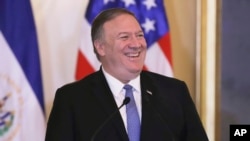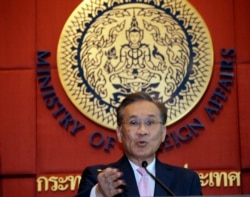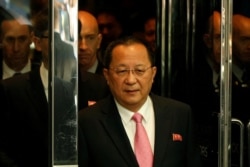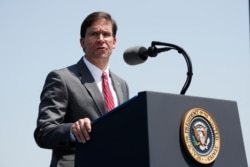Updated : Tuesday, July 30, 2019, 2:50 p.m.
STATE DEPARTMENT — The United States is not ruling out working-level talks with North Korean officials on the sidelines of Southeast Asian regional meetings in Thailand this week, with experts noting Pyongyang's recent missile launch is unlikely to reverse Washington's current diplomatic efforts.
U.S. secretary of State Mike Pompeo departed Tuesday from Washington for Bangkok, where he will co-chair the U.S.-Association of Southeast Asian Nations (ASEAN) Ministerial later this week.
On Aug. 2, Pompeo will participate in the East Asia Summit (EAS) Ministerial and the ASEAN Regional Forum (ARF) Ministerial, and will hold a bilateral meeting with Thai Foreign Minister Don Pramudwinai to discuss ways to further strengthen the U.S.-Thai alliance.
"I head to Asia tomorrow midday, I'll be in Bangkok for a couple of days. We hope that we can have working-level discussions starting again very soon," Pompeo said Monday when asked about diplomatic engagement with North Korea during an event in Washington.
"We're not going to talk about the specific bilateral meetings, other than the ones that have been announced," said a senior State Department official in a briefing when asked if U.S. officials will hold talks with North Korea officials on the sidelines of ASEAN meetings.
In recent days, the U.S.-led United Nations Command said it will continue to support confidence-building measures setting the stage for dialogue, and for diplomats to work toward permanent peace and final, fully verified denuclearization of North Korea.
After North Korea's latest ballistic missile test last Thursday, Pompeo suggested talks could still continue.
"I think we're still going to proceed," said the top U.S. diplomat in an interview with Fox News. "I mean, I think we're still going to go sit down and have a conversation about this. North Korea has engaged in activity before we were having diplomatic conversations far worse than this."
Media reports said North Korean Foreign Minister Ri Yong-ho will not attend this week's ASEAN related meetings in Bangkok. While in the past North Korea's foreign minister had skipped the forum from time to time, Pyongyang has always sent other diplomats to attend.
"We are clearly going to be continuing to talk to our allies who face this issue quite closely," State Department spokesperson Morgan Ortagus told VOA on Monday.
Foreign ministers from Japan and South Korea will also attend the East Asia Summit in Bangkok.
North Korea's July 25 missile tests were a "relatively modest [action] along the North Korean messaging spectrum," argued Todd Rosenblum, a nonresident senior fellow of the Atlantic Council. He said Pyongyang's latest missile launch "should not and likely will not have much impact on current negotiating efforts."
South China Sea
Pompeo's meetings with ASEAN foreign ministers also come amid China's increasingly assertive actions in the South China Sea, a resource-rich region contested by several ASEAN members, Brunei, Malaysia, the Philippines, and Vietnam, as well as Taiwan and China.
China has landfilled and militarized islets over the past decade.
"We have an interest in ensuring stability there," said a senior State Department official.
The U.S. strongly opposes China's efforts to assert its unlawful maritime claims in the South China Sea. Washington is calling for a code of conduct between China and ASEAN to be "in line with" existing international laws.
"We're very concerned," Ortagus told VOA in an interview Monday, referring to recent Chinese anti-ship missile launches from man-made structures in the disputed South China Sea, and a standoff between China and Vietnam.
Last week, Vietnam urged an "immediate withdrawal" of a Chinese government-run vessel in the disputed South China Sea as the standoff between the two nations over China's ongoing geological survey work intensified. China asked Vietnam to respect "China's sovereign rights and jurisdiction" over the area near the disputed Spratly Islands. Vietnam said Chinese vessel's activities fall within the Vietnamese waters.
Chairman of the U.S. House Committee on Foreign Affairs Congressman Eliot Engel recently issued a statement on Chinese interference in Vietnamese-controlled waters.
"China's recent aggression in the South China Sea is a disturbing demonstration of a country openly flouting international law," said Engel. "Just as importantly, China's behavior threatens the interests of U.S. companies operating in the area."
Australia, Pacific Islands
From Thailand, Pompeo will head to Australia on Aug. 4. Newly sworn-in U.S. Secretary of Defense Mark Esper will join Pompeo in Sydney for the Australia-United States Ministerial Consultations (AUSMIN).
"The United States has no better friend or ally than Australia," said a senior State Department official in a phone briefing to reporters. Pompeo will safeguard "sovereignty in Pacific Island countries and Southeast Asia," according to the State Department.
On Aug. 5, the top U.S. diplomat embarks on a trip to the Federated States of Micronesia, making him the first sitting U.S. secretary of state to visit the Pacific Island nation. The visit comes days after an inauguration ceremony of its new President David Panuelo.
Pompeo will also meet with leaders from Pacific island nations that have compact associations with the U.S., including Palau and the Marshall Islands. The U.S. provides more than $350 million in projects and economic assistance to the Pacific island nations during the last fiscal year.
The U.S. is working with the Federated States of Micronesia "in keeping the Western Pacific and Indo-Pacific region free and open," said State Department's Director for Australia, New Zealand, and Pacific Islands Nicholas Dean in a recent briefing.




